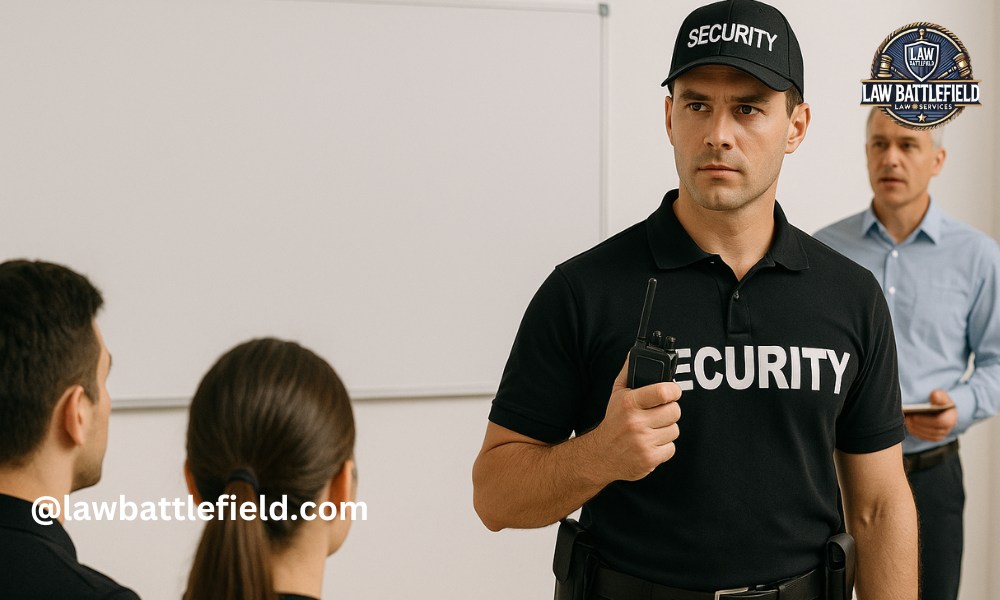Choosing a career in security is more than just putting on a uniform. It’s a commitment to responsibility, safety, and professionalism. For many, getting started begins with one essential step: completing the required security guard training and obtaining what’s commonly called a “Blue Card.” If you’ve been wondering how to get a security guard card, the process involves more than just paperwork – it requires proper training and a clear understanding of your responsibilities. But beyond the coursework and licensing, there’s a lot to understand about what this role demands and what your rights are as a future guard. If you’re considering this path, or you’re already enrolled in a course, here’s what you need to know.
What Is The “Blue Card” And Why Does It Matter
The Blue Card is your ticket into the private security field. It represents that you’ve completed the necessary training and are legally eligible to work as a security guard. The process typically involves a multi-phase training program that covers powers to arrest, appropriate use of force, handling emergency situations, communication protocols, and legal limits of authority.
Depending on your state, the training is split into mandatory classroom hours and optional or advanced add-ons. Many programs now offer online modules to make it easier for students to complete the initial hours at their own pace. In addition, hands-on training sessions prepare candidates for real-life situations they may encounter on the job.
Expect More Than Just Sitting In A Classroom
Security guard training isn’t just about memorizing legal definitions or going through boring lectures. You’ll engage with real-world scenarios, simulations, and role-playing exercises that test how you think on your feet. This is especially important because guards often operate in unpredictable environments – whether it’s patrolling a construction site at night or managing crowd control at public events.
Physical conditioning, situational awareness, and communication skills are all emphasized. The role can be demanding, and that’s why proper training is crucial, not only for your safety but for the safety of the people and property you’re assigned to protect.
What Happens If You Get Injured During Training Or On The Job
It’s a part of the job no one wants to think about – but injuries do happen. Security work involves physical effort, exposure to conflict, and sometimes even hazardous environments. Whether you’re escorting someone off the premises, breaking up a fight, or just patrolling in poor weather conditions, risk is always present.
What many don’t realize is that injuries can happen even during training. And yes – if you are enrolled in a legitimate course and get injured during an official exercise, you may still be entitled to compensation under workers’ compensation laws.
In case of an injury, either on the job or during an authorized training program, it’s crucial to understand your rights. Workers’ compensation exists to help injured employees cover medical bills, lost wages, and rehabilitation. But navigating that system alone can be complicated and frustrating, especially if your claim is denied or delayed. That’s where an experienced workers’ compensation attorney comes in. These legal professionals specialize in ensuring that workers, whether seasoned employees or trainees, get the financial and medical support they’re entitled to. Skilled advocates at workerscompensationattorneyorangecounty.com/, can help guide you through paperwork, deadlines, and disputes with insurance providers so you can focus on healing. In situations involving physical injuries, emotional trauma, or long-term limitations, having a legal advocate on your side can make the difference between struggling through red tape and actually receiving fair compensation.
What Can You Do With Additional Certifications
Beyond the basic training and Blue Card, many future guards choose to expand their qualifications. There are optional certifications in baton training, pepper spray use, CPR, firearm handling (for armed guards), and even taser deployment. These courses not only make you more competitive in the job market, but they can open doors to higher-paying and specialized roles in executive protection, mobile patrol, or surveillance.
Some employers may even require additional credentials depending on the environment – like working at hospitals, schools, or government buildings.
Know Your Rights And Your Responsibilities
Getting your security guard license is just the beginning. This career path comes with a unique blend of responsibility, risk, and reward. While you train and prepare to protect others, don’t forget to protect yourself, too. That means knowing your rights when it comes to workplace injuries, understanding the value of proper legal support, and recognizing the signs that something isn’t being handled fairly.
Whether you’re studying for your Blue Card or already patrolling your first post, remember that the goal is not just to be qualified – but to be confident, informed, and protected.
Was this article helpful? Check out more on Lawbattlefield.com
Temu Lawsuit: What You Need To Know About The Privacy And Data Security Claims





